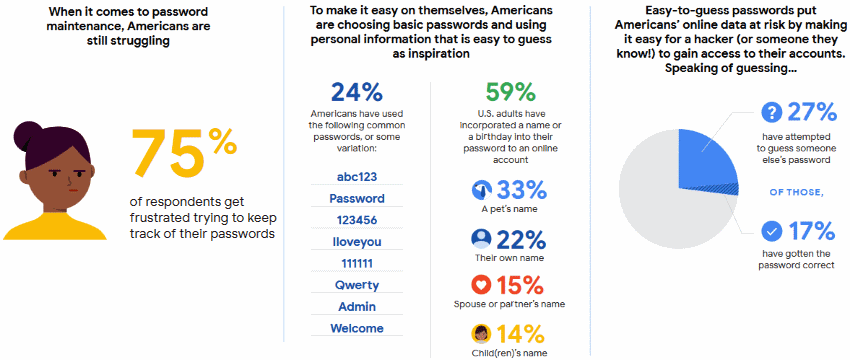One of Google’s study with Harris Poll revealed the real truth behind passwords creation of native Americans. The vast majority faces frustration and even difficulties when coming up with a password. Having no secure strategy in mind and lacking an operating system to ensure that password verification has the latest security updates simply makes the American people struggle (nearly 75%).
Beyond that, people also lack inspiration and creativity, which simply leads them to use easy-to-remember passwords. Github passwords’ list represents the top 10000 options, the five most popular of which are: 123456, Password, 12345678, qwerty, 123456789.

But, the problem is that everything easily memorable is often super easy to guess or hack. People keep using their birthdates, name of their pets, a common sequence of letters or numbers, which brings them to where they are. Fully lost and unsafe.
It is not the case that the Americans don’t take it seriously. Quite the opposite, they understand the full responsibility for a weak crackable password and are willing to take care of their passwords and sensitive information. The science of password selection is very easy though.
What we would suggest is to avoid sharing personal information and alternatively come up with a combination of unique characters that can strengthen it. These might include capital letters, numbers, and special characters. No difficult algorithms or tricky methods.
Password management of an average American implies more convenience than much concern about its complexity or reliability. Also, it seems to be the process of memorization rather than proper digital security. Who would want to spend additional time on writing notes or deploying a password management program? We all aim to register and pay no attention to the password unless a new log-in experience comes. Such a set it and forget it process.
Thus, the majority of Americans keep track of their passwords using much more traditional methods as trying to memorize by heart or through writing. They feel quite reluctant to create digital notes or use management software, which sounds like a sort of underestimation of modern software systems.
Correspondingly, around 45% change their passwords after an account, website breach. This lies in our human nature. We want to make changes only after we face a certain risk or damage. However, convenience might have a higher cost than we expect it to be. So, in order to protect personal accounts, more and more Americans go for proper security systems.
The form of protection might vary from VPN services to two-factor authentication systems. Regardless of your activities online, you should always be able to prevent the damage of your accounts in a safe environment, such as trustworty VPN or find software solutions with the help of a good software development company. The most popular of which are VironIT, Dreamztech, etc.
At the end of the day, memorizing stuff in your head or paper is far from efficient. It is important you take care of sensitive information, as passwords in the right way. Even if you are not savvy enough, there are plenty of opportunities for how to get what you want.
While cyberattacks are top-of-mind for every American, the response towards the digital security of the younger generation in the US leaves something to be desired. People aged between 12 and 24 years old are less concerned about hacking, passwords damages, etc because they are convinced to be more experienced in the usage of unique passwords.
According to the recent poll in the US concerning password habits and online security, it was shown that older Americans still remain very lax about sharing their passwords with friends or family members, using two-factor authentication or changing their passwords regularly.
They acknowledge the fact that cybercriminals store their personal information and take advantage of it through data breaches or selling on the darknet for a particular abuse. Still, the findings of an annual report by Security.org demonstrate a bit of carelessness of password management. Just to give you some numbers, forty-five percent of Americans use passwords that are eight characters or less, a less half of this percent uses reliable password generators.
Pure attempts to create a strong password often turns into the Americans personal data vulnerability due to predictable and weak keywords. The elderly pay more attention to it and try to improve their secure habits by running antivirus software, updating computers or just constantly changing passwords. They know that privacy and security cost more than anything else.
To sum up, there are many ways of how an average American user creates and stores passwords to their various online accounts. Their defense against unauthorized access to user data and password management are still to be improved. One conclusion is obvious: Americans really need to step up their game and strengthen their passwords.